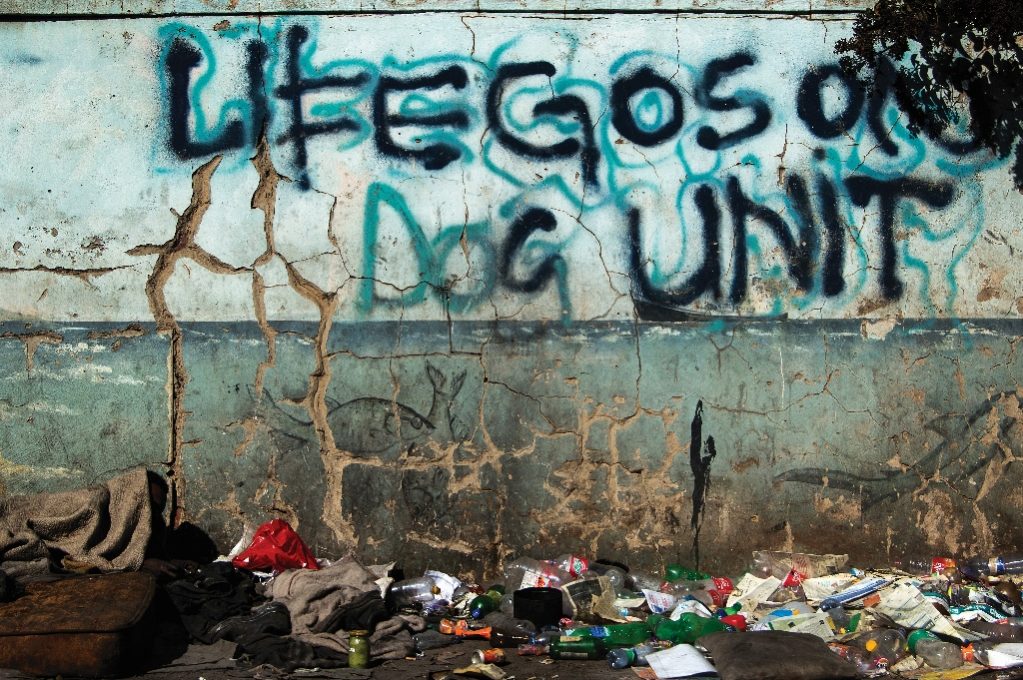It’s a chilly night; a group of Africa’s highest paid people crowd around fires and set up their sleeping bags in Sandton to raise awareness for the homeless. They’ve brought the brands with them on hot water bottles, sleeping bags, charging stations, shoe shiners, a mini golf course and soup made by one of South Africa’s finest chefs. This may have been surreal but the 702 Sun International CEO SleepOut raised more than $2 million for Girls & Boys Town, an NGO that helps troubled children.
Just a few miles away, in the cold streets of Johannesburg, people who are forced to sleep on the street huddle into an abandoned sports college. In the worn-down buildings with cardboard roofs, piles of rubbish and graffiti covered walls, there’s room for 50, but home to 300. The shelter is called Bekezela and rightly so, it means to be patient. But patience wears thin without running water, electricity or toilets.
“As South African people, we feel like outsiders here,” say many.
Despite this yawning gap on a cold night, there are links between the haves and the have nots.

Loading...
Migrants
Johannesburg is home to immigrants, in search of fortune, from Swaziland to Portugal.
For Maria Ramos, the CEO of Barclays Africa, her venture to Johannesburg began with university. Born in Portugal, her family left for Mozambique in the 1960s. Like many, she moved to Johannesburg for the promise of a better tomorrow. Accumulating degrees and accolades, she soon went up the ranks.
“I think the opportunity to have a lot of conversations has been the most eye-opening part for me, a lot of the conversations we’ve been having have been around the fact that when we put our minds together we can really rally around big issues and find solutions. I think it’s important because as South Africans and Africans we have a lot of challenges but we also have phenomenal opportunities to find solutions to those challenges,” says Ramos.
In Bekezela, challenges are plenty and solutions are few. A migrant from Swaziland, Thoko Mabila’s story is as far from the CEO of Barclays as can be. She came to Johannesburg at 18 in search of work and slept on the street at first. She trips over her words, she isn’t sure about her age. She worked as a domestic worker in Mayfair, a predominantly Indian area in the city center, but the family moved and she struggled to get work again. Her arm is adorned with Indian plastic bangles, from the family she worked for. Mabila was diagnosed HIV positive five years ago.
“I need to take ARV’s but they’re hard to get and when I get them, I can’t take them if I don’t eat,” says Mabila.
She doesn’t have the energy to work anymore and doesn’t know when her next meal is.

“I just want the world to know about us, they need to know we’re suffering,” she says.
Leaders
Elected the Premier of Gauteng in 2014, David Makhura’s career began in student and youth politics. As the ANC provincial secretary, he oversaw policy implementation and governance. Kitted out in South African gear, Makhura is surrounded by a cluster of people hanging on his every word.
“We’re out here to make a contribution to feel and see that we’re helping somebody that might be in hopeless circumstances, we’re giving them hope. We’re giving them a second chance in life so they can see that life is worth living. Many of them could be our leaders,” says Makhura.
Across the tracks, there’s uncertainty for Bekezela, but their leader clings on to hope. Nhlanhla Khumalo is quiet and broody – he speaks English, but rarely chooses to. Living in Bekezela since 1998, he moved to Johannesburg from the Eastern Cape with his wife, Lucia Khumalo – the self-proclaimed “mother of Bekezela”. In 2012, he was granted a court order, the rights to Bekezela. The last three years he has been embroiled in a battle against Passenger Rail Agency of South Africa (PRASA) who want to build a railway through the land.
“Who’s fighting for us? It’s not our leaders,” says Khumalo.

The 12-Year Stretch
Twelve years means a world of difference. For Faith Khanyile, the CEO of WDB Investment Holdings, it meant success with Standard Bank in the Corporate and Investment Banking division. Her 12-year stint was a stepping stone – she is now the chairperson of Standard Bank’s structured debt finance equity forum and director of Uthingo Management Services. Clutching on to her hot water bottle, she’s dressed in thick layers and huddled next to the fire; aware that it’s going to be a sleepless night.
“We’re here, we’re uncomfortable, we’re outside of our beds and away from our families – it’s just going someway to experience what they experience. Obviously they sleep outside every night. But for one night, we want to really be with them and experience what they go through,” says Khanyile.
For Lucas Sithole, his experience is far from warm clothes and hot water bottles. He’s lived in Bekezela for 12 years, where he sleeps on a board under a makeshift porch. He’s one of the city’s army of people who collect rubbish on the streets and then sells it to recycling companies. He wakes up at the crack of dawn – there is competition between recyclers and garbage trucks. He goes through dustbins – finding things to recycle, things to keep. He walks the length and breadth of the northern suburbs lugging a trolley triple his weight. Sometimes people give him clothes, like his prized leather jacket. He works long hours but for 12 years he’s had no running water and no room to sleep in.

They’re worlds apart. After the 12-hour event, CEOs across the city returned to their luxurious homes and climbed into warm beds. The residents of Bekezela didn’t.
Loading...
